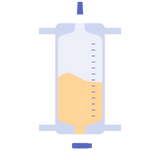
What is IV Therapy? Benefits, Side Effects, and Costs
Posted by Pankaj Dhiman on Aug 28th 2023
What is IV Therapy?
IV therapy, or intravenous therapy, is a medical procedure that involves the delivery of fluids, medications, or nutrients directly into the bloodstream through a needle inserted into a vein. IV therapy can be used to treat a variety of conditions, including dehydration, infections, and electrolyte imbalances. It can also be used to deliver medications that cannot be taken orally or by injection.
Understanding IV Therapy
IV therapy, also known as intravenous therapy, involves the direct administration of fluids, vitamins, minerals, and other essential nutrients into the bloodstream through a vein. Traditionally utilized in medical settings to deliver medication or fluids to patients unable to consume them orally, IV therapy has expanded its horizons to include wellness and health optimization. This alternative approach bypasses the digestive system, allowing nutrients to be absorbed more rapidly and efficiently by the body.
Buy Now - D.U. Medical Transparent Film Dressing
Benefits of IV Therapy
The surge in popularity of IV therapy can be attributed to the array of potential benefits it offers. Here are some of the advantages individuals seek when considering IV therapy:
- Nutrient Absorption: IV therapy enables direct delivery of nutrients into the bloodstream, bypassing the digestive system's potential barriers. This ensures a higher absorption rate, making nutrients readily available for the body to utilize.
- Quick Rehydration: IV therapy can provide rapid rehydration, making it an effective solution for individuals who are dehydrated due to illness, intense physical activity, or inadequate fluid intake.
- Boosted Energy Levels: By delivering vitamins and minerals directly into the bloodstream, IV therapy may lead to a quick energy boost, which can be especially beneficial for those battling fatigue or recovering from illness.
- Enhanced Immune System: Certain IV formulations contain immune-boosting nutrients such as vitamin C, zinc, and antioxidants. Regular sessions might help fortify the immune system and reduce the likelihood of infections.
- Hangover Relief: IV therapy has gained popularity as a potential hangover remedy. The infusion of fluids and essential nutrients can aid in alleviating hangover symptoms like nausea, headache, and fatigue.
- Skin Rejuvenation: IV therapy can include components like collagen and biotin, which are thought to promote healthier skin, hair, and nails.
- Stress Relief and Mental Clarity: Some formulations include vitamins that are believed to have a calming effect on the nervous system, potentially aiding in stress reduction and improved mental clarity.
Order Now - Get Medical Supplies in Wholesale
Potential Side-Effects of IV Therapy
While IV therapy can offer numerous benefits, it's essential to be aware of potential side-effects and consult a healthcare professional before undergoing any treatment. Some possible side-effects include:
- Infection Risk: Any procedure involving needles and catheters carries a risk of infection at the injection site or within the bloodstream.
- Allergic Reactions: Although rare, allergic reactions to the components of the IV solution are possible.
- Imbalance of Nutrients: Improper administration of IV therapy can lead to an imbalance of nutrients in the body, potentially causing harm rather than benefit.
- Vein Irritation: The insertion of needles can irritate the veins, leading to discomfort or pain at the injection site.
- Fluid Overload: In some cases, excessive fluid administration can lead to fluid overload, which might affect the heart and lungs.
Must Read - 10 Ways to Improve the U.S. Healthcare System in 2023
Cost Considerations
The cost of IV therapy can vary widely based on factors such as location, the specific formulation of nutrients, and the provider's expertise. On average, a single IV therapy session can cost anywhere from $100 to $300 or more. Some providers offer packages or memberships that can bring down the cost per session.
Insurance Coverage
It's important to note that IV therapy for wellness and non-medical purposes is often considered elective and not covered by health insurance. Insurance typically covers IV therapy only when it's deemed medically necessary and administered in a clinical setting.
Have a look - Nurses: Overworked and Understaffed on the Front Lines
When to Consider IV Therapy
IV therapy should only be considered after consultation with a healthcare professional. The decision to undergo IV therapy will depend on the individual's medical condition and needs.
If you are considering IV therapy, be sure to discuss the risks and benefits with your healthcare provider. They can help you determine if IV therapy is right for you.
Choosing a Reputable Provider
When considering IV therapy, it's crucial to choose a reputable provider. Here are some steps to help you make an informed decision:
- Research: Look for providers with positive reviews, experience, and certifications in administering IV therapy.
- Consultation: Schedule a consultation to discuss your health goals, any pre-existing conditions, and potential allergies with the provider.
- Transparency: A reputable provider should be transparent about the ingredients in the IV formulation and the potential outcomes.
- Clean and Professional Environment: Ensure that the facility adheres to proper hygiene and infection control practices.
- Medical Oversight: If possible, opt for providers that have a medical professional on-site or available for consultation.
Conclusion
IV therapy has evolved from a medical procedure into a wellness trend, offering potential benefits like efficient nutrient absorption, rehydration, and immune system support. However, individuals interested in exploring IV therapy should be aware of potential side-effects and carefully consider the costs involved. It's always recommended to consult with a healthcare professional before undergoing any form of treatment, and to choose a reputable provider that prioritizes safety, transparency, and efficacy. As with any health-related decision, an informed choice is key to reaping the potential benefits while minimizing risks.





























































